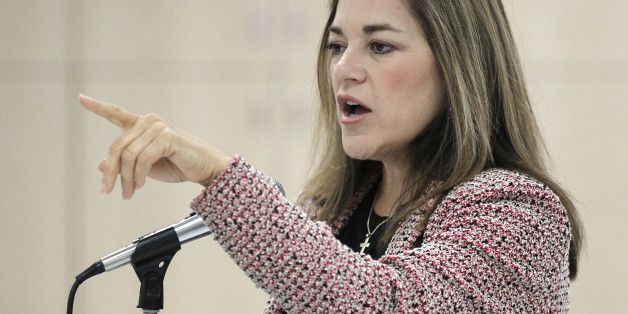CA GOP shut out of U.S. Senate race
by James Poulos | June 9, 2016 10:18 am

California Republicans emerged from a bruising primary election day without a candidate in the runoff race to replace outgoing Sen. Barbara Boxer — triggering an unprecedented new political calculus in which GOP voters will be courted by the underdog Democrat. “Democratic Orange County Rep. Loretta Sanchez survived Tuesday’s U.S. Senate primary election, but finished so far behind front-runner Kamala Harris that her chances of a surprise victory in November may depend on a disparate patchwork of California voters, including a bevy of Republicans,” the Los Angeles Times noted[1].
“Out of a field of 34 Senate candidates, Harris won 40.4 percent of the vote Tuesday compared with Sanchez’s 18.6 percent. The Democratic state attorney general bested Sanchez in all but five of California’s 58 counties and almost beat the congresswoman in her home county, according to preliminary election returns.”
Although a range of factors compounded to create the disappointing result, California’s newfangled “jungle primary” system bore primary responsibility. The arrangement, pitched via Proposition 14 “as a way to force politicians to campaign toward voters in the middle rather than at the extremes,” appeared instead to pull the electorate to the left, not the middle, as the San Jose Mercury News reported[2]:
“GOP candidates failed to advance in many of the Bay Area’s premiere contests as well as the race for the Golden State’s first open U.S. Senate seat in more than two decades. Two Democrats will compete in that contest as well as the races to represent the 14th Assembly District, which covers northern Contra Costa and southern Solano counties, the 24th Assembly District, which straddles San Mateo and Santa Clara counties, and the 27th Assembly District, which covers most of south San Jose and the Evergreen area, among others.”
In at least some instances, however, these bad-news outcomes for the state GOP will come with a perverse silver lining. “With Democrats Sanchez and Harris squaring off for the Senate seat, Republicans will have no one other than Trump at the top of their ticket. And his presence will ripple to every congressional, state Senate and Assembly race,” the Sacramento Bee’s Dan Morain surmised[3]. “You could have historic low turnout for Republicans,” one Democratic consultant told Morain, having blown his prediction that at least one Republican would make it onto the ballot for Senate in November. During an election cycle when long-festering disagreements among Democrats could have presented some problems in the voting booth, Trump’s potential to disorganize and demoralize California Republicans has restored confidence among party leaders. But Republicans desperate to avoid being tarred with Trump’s brush will be spared in districts where they’re not fielding a candidate thanks to the jungle primary.
California Republicans could also find themselves with a paradoxical opportunity to find common ground with Latino voters. Both blocs, analysts have agreed, are especially inclined to throw their support toward Sanchez and away from Harris. Latinos have more than ethnic affinity at play in their preference for Sanchez: California’s longstanding geographic divide has left Southern Californians, including many Latinos, without as much influence in and around Sacramento as Bay Area Democrats.
But in addition to the opportunity to pull the lever for Sanchez, Latinos have also been projected to turn out in droves for another reason. “Latino voter registration in California has nearly doubled this year, according to the secretary of state’s office,” the New York Times observed[4]. “Many believe those newly registered voters will turn out on Tuesday, driven in large part by anti-immigrant rhetoric from the Republicans’ presumptive nominee, Donald J. Trump. In a poll released in late May, Ms. Sanchez had the support of roughly 48 percent of Latinos, compared with 19 percent for Ms. Harris.”
Although Trump won California’s Republican primary, party leaders generally fear his impact on their political fortunes. In joining forces with Latinos for Sanchez, the state GOP would gain a chance to rebuild bridges Trump could otherwise destroy.
- noted: http://www.latimes.com/politics/la-pol-ca-loretta-sanchez-republican-voters-20160608-snap-story.html
- reported: http://www.mercurynews.com/california/ci_29994839/californias-top-two-primary-system-shuts-out-republicans
- surmised: http://www.sacbee.com/opinion/opn-columns-blogs/dan-morain/article82650227.html
- observed: http://www.nytimes.com/2016/06/05/us/california-senate-race-is-a-tale-of-diversity-and-a-flailing-gop.html?_r=0
Source URL: https://calwatchdog.com/2016/06/09/ca-gop-shut-senate-race/